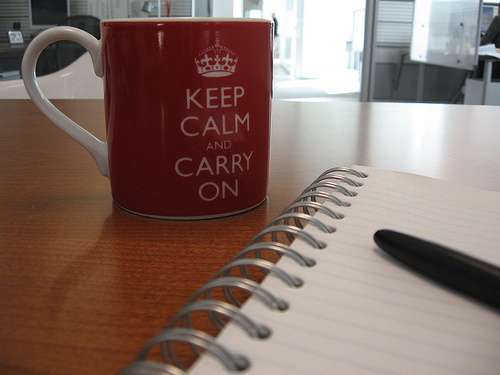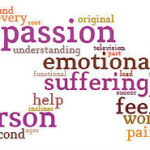Whether we are happy or not depends on our attitude; compassion, for instance, leads to a calmer mind. – Dalai Lama

What is your attitude? Blank paper can be calming if your attitude is anticipation. It can be quite unpleasant if your attitude is dread. Choose a useful attitude, and all will change.
What does that mean?
This is a quote about the link between our attitude and our mood. It’s hard to feel happy when you are angry. The emotion of angry isn’t really compatible with the mood of happy, right? There are other incompatible mixes of attitude and mood with which we are familiar, each in our own separate way.
The example uses the attitude of compassion, and how it can easily lead to a calmer mind. While it might not be the first thought in your head, it makes sense when you think about it, doesn’t it? When I think of the times when I had great compassion, my mind was clear and generally trouble free.
While there are plenty of other ways to demonstrate this pairing, the example from the quote, which is one of the favorite attitudes of the author of the quote, is a great place to start. It’s hard to beat compassion and a calmer mind, right?
Why is compassion important?
Here, we are using compassion as an example, but it works with any outwardly focused, calming attitude. These lead us towards calm, and with it a certain sense of peacefulness and comfort. It can even lead to a little happiness, if we aren’t careful.
Why does compassion do these things to us? While I’m no expert on these things, I do have several decades of practical experience, which is usually considered sufficient credentials for the internet. And what I have experienced in that time is that too much self-centered-ness leads to inner turmoil.
Compassion usually focuses us on the problems of others and doing what we can to reduce that suffering. It leads us away from being self-centered and seeing others as having challenges in their lives as well. It helps to connect us to them, and bring out the best in us.
This connected-ness and desire to help, the understanding of the plight of others, even if not the kind of thing of which late night commercials are made. This helps give us perspective, and that helps us to calm ourselves and better see our place in the larger picture of life.
Where can I apply this in my life?
Compassion, while a noble end onto itself, is just a part of happiness and a good life. Take a moment to think about what it takes for you to be happy. Don’t focus on the things, but your attitudes and your feelings at the times when you have been very happy.
If you were very happy to have someone back who was away for a time, is it that person, or the feeling of connected-ness which helped bring you to feel happy? Is it the shiny new tech toy, or the mastery of a new set of skills which helped bring you to feel happy?
In each case what was your attitude when this was happening? How did your attitude contribute to your feeling of happiness? Consider two scenarios of someone returning. In one case, your attitude is one of gratitude, happy to have them back. In the other case, your attitude is anger, because they were supposed to be back two hours ago, and where have they been?
The same thing has happened. The difference is the attitude, and from that attitude comes our feelings. In the example, happy or angry were the ending emotions. Sometimes you get a roller coaster ride, as any parent of a driving age teen can attest.
“I’m glad you’re home safe. I’m going to kill you for being out late!” If you haven’t uttered those words, you’ve probably heard them, or heard others talk about their kids or parents. Life can be complicated. But I would hope that the anger will fade rapidly, and that calmness and happiness can take over their lives.
Our attitudes become a filter through which we observe life around us. If the filter prevents us from seeing the good things and draws our attention to the bad, will it be easier or more difficult to find happiness? Yes, there are other things going on, and nothing is quite that simple, but it is a significant factor, at least in my experience.
What are your most common attitudes? Do you believe the world is conspiring to help you be happy, or that it is conspiring to make you miserable? What kinds of lenses do you typically view the world? How does these lenses alter what you are seeing, by diminishing some things and accentuating others?
Happiness, in the end, is up to us. Only we can make ourselves happy. Yes, outside forces can make it easier or more difficult, based on your attitudes and values. But those are also under your control.
It may take some practice, but you can change your attitudes, and with that, so much more. When will you start?
From: Twitter, @DalaiLama
confirmed at : it’s his own feed…
Photo by Wade Rockett







Pingback: The post in which I write about happiness: A life sentence with mortal punctuation, part 10 | Writerly Goodness
Thank you so much for this post. I need it badly 🙂
I’m glad that the post was here to help you. I hope you are soon doing well enough to not need the post, except as inspiration.
Stay strong.
Pingback: Happiness Is A Skill | The Happiness Box